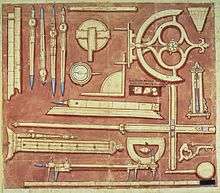Christoff Schissler
Christoff Schissler (c 1531 -. 14 September 1608) was a German builder of high precision scientific instruments.
Career
His professional life was largely spent in Augsburg where he made navigational instruments such as astrolabes, quadrants,[1] and armillary spheres. He also invented a portable sundial that adjusted to operate on different latitudes between England and Italy.[2]
In 1571 Schissler travelled to the court of Augustus of Saxony in Dresden and in 1583, to the court of Rudolf II in Prague.[3]
In his later years he focused on mapping and surveying Augsburg. He had his own specialist workshop, where his son Hans Christoff would later continue his work.

Legacy
Over a hundred of his instruments are preserved today in various museums across the world, including the Museo Galileo[4] and the Victoria and Albert Museum.[5]
A rare gilt brass astrolabe by Schissler was due to be auctioned with an £80,000-120,000 ($119,170-178,756) estimate at Bonhams London on May 19, 2015.[6]
References
- ↑ Johann Beckmann, William Francis, John William Griffith (1846), A history of inventions, discoveries, and origins , Volume 1, p. 7
- ↑ M.. J. Rodríguez-Salgado, M. J. Rodríguez-Salgado (1988), Armada 1588-1988 ', National Maritime Museum (Great Britain)
- ↑ "Christoph Schissler". Museum of the History of Science, Oxford.
- ↑ "Christoph Schissler c. 1531-1608". Museo Galileo.
- ↑ "Astronomical compendium". V&A Museum.
- ↑ "Christoff Schissler brass astrolabe valued at up to $179,000". Paul Fraser Collectibles.